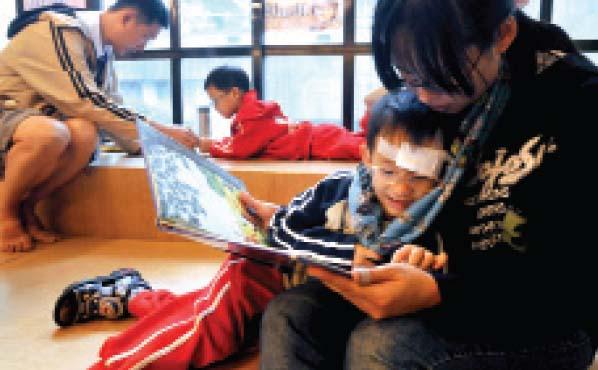You are here
US doctors urge parents to read to babies
By AFP - Jun 26,2014 - Last updated at Jun 26,2014

WASHINGTON — A leading US doctors’ group Tuesday urged parents to read to their children starting in infancy, in order to boost language skills in an age of screens and smartphones.
Pediatricians have long encouraged reading to children, but the guidelines are the first official policy from the American Academy of Pediatrics telling doctors to talk to parents about daily reading to their children, from the first year of life until kindergarten.
It also calls on doctors and policymakers to ease the burden on poor and working families by distributing kids’ books for free to children in need.
Reading with young children “stimulates optimal patterns of brain development and strengthens parent-child relationships at a critical time in child development, which, in turn, builds language, literacy and social-emotional skills that last a lifetime”, the AAP guidelines said.
Research has shown a stark divide among economic lines when it comes to reading — just one in three children in poverty are read to daily, resulting in “a significant learning disadvantage” when they get to school, the AAP added.
Even wealthier families do not always make reading a ritual, with 60 per cent of those with incomes 400 per cent of the poverty threshold saying they read to their children from birth to age five, according to a 2011-2012 survey.
Babies can benefit
Busy schedules are a constant obstacle, and some pediatricians are concerned about the widespread use of screen technology — from televisions
to smartphones and tablets — which may be edging out reading time, too.
The AAP has previously said babies under age two should be as screen-free as possible, and that the best kind of learning takes place through unstructured,
interactive play with humans and toys.
Very young babies can get benefits from reading, even if they do not seem interested, said Peter Richel, a fellow of the AAP and chief of pediatrics at Northern Westchester Hospital in New York.
“We can stimulate greater brain development in these months and years,” said Richel.
“I do see earlier word recognition, earlier phrases and sentence formation, and singing — I always recognise that in those who are exposed to daily reading.”
In order to bridge the income gap, the AAP said it “supports federal and state funding for children’s books to be provided at pediatric health supervision visits
for children at high risk”.
Speaking at a Clinton Global Initiative America meeting in Denver, Colorado, former secretary of state Hillary Clinton said she supported the new guidelines.
Clinton also announced that Scholastic, a leading publisher of children’s books, would donate 500,000 books that pediatricians could distribute to families in need.
“By four years of age, children in lower-income families tend to have heard more than 30 million fewer words than children in more affluent families. Thirty million. Because they hear fewer words, they learn fewer words,” Clinton said.
“The word gap leads to an achievement gap that can have lifelong consequences.”
Clinton, whose daughter Chelsea is pregnant, said she remembered seeing her daughter’s face light up when she and her husband read to her as a child.
“Certainly we saw that when Bill and I were reading to Chelsea and we expect to do the same with our new grandchild coming in the fall,” Clinton said.
Related Articles
MIAMI — To reduce the risk of sudden death, babies should sleep in the same room as their parents but in their own crib or bassinet for the
Spending too much time on screens? Many parents notice that their children are getting more and more attached to their screens and devices. What are the guidelines for screen use?
Parents who put babies to sleep in their own rooms report the infants get more rest and have more consistent bedtime routines than parents w

















